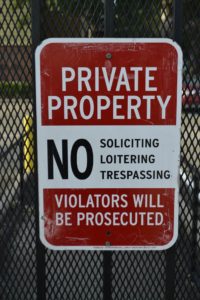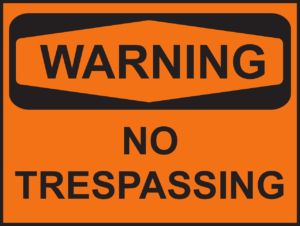Everyone at some point has seen a bright red sign clearly stating, “No Trespassing,” and most people intuitively understand the concept that people may not enter the area without explicit permission. However, California law, under Penal Code 602, Criminal Trespassing, deals with an individual interfering with the use of property belonging to someone else, or an individual acting in a bothersome way on someone else’s property, or an individual refusing to leave after the property owner asks him or her to do so.
The prosecution must prove three distinct elements of the crime to convict someone of criminal trespass in California. The elements include the following:
- The defendant willfully entered someone else’s property
- He or she acted with the specific intent to interfere with the property owner’s rights
- The defendant actually did interfere with the property owner’s rights by damaging their property or interfering with their business
The State of California recognizes criminal trespass as an infraction, misdemeanor, or felony. The prosecution determines which severity to pursue by assessing the specific circumstances of the case.
The penalties for criminal trespass in California vary depending on how the prosecution charges the crime. Generally, the defendant faces misdemeanor or infraction penalties.
If the prosecution pursues a misdemeanor charge of criminal trespass in California, the defendant can face penalties of up to six months in county jail and fines of up to $1,000.
However, other cases of criminal trespass in California may lead to mere infraction charges, with penalties consisting of only a small fine.
The severest form of criminal trespass in California is called “aggravated trespass”. California Penal Code 601 defines aggravated trespass as an event in which the defendant threatens to injure someone physically, and then enters his or her home or workplace without permission within 30 days of the threat. The State of California considers aggravated trespass to be a wobbler, meaning that the prosecution may pursue either misdemeanor or felony charges. The felony penalties for aggravated trespass may also include felony trespass charges. The defendant could face a jail sentence of from 16 months to three years.
Experienced criminal defense attorneys can research the situation and the series of events in order to more skillfully defend the accused. More information leads to a stronger defense, and aggressive defense attorneys understand how to find information pertinent to the case.
Defining Criminal Trespass
California State Penal Code 602 defines about 30 activities considered to be criminal trespass using over 3003 words. However, we will attempt to simplify the concept.
California State Penal Code 602 prohibits a few fundamental acts under California trespassing laws as described below:
- An individual may not enter someone else’s property with the specific intent to damage that property
- A person may not enter someone else’s property with the specific intent to interfere with or obstruct the business activities conducted there
- Someone may not enter and “occupy” another person’s property without permission
- People may not refuse to leave private property after the property owner asks him or her to do so
However, Penal Code 602 also prohibits obscure forms of criminal trespass in California, which include:
- Knowingly skiing in an area or on a ski trail which is closed to the public and which has signs posted indicating the closure
- Deliberately taking soil, dirt, or stone from someone else’s land without permission
- Taking oysters or other shellfish from someone else’s land
- Refusing to be screened at an airport or courthouse.
Elements of The Crime
California State Juror Instructions 2930 describe the following consistent elements of the crime which the prosecution must prove beyond reasonable doubt.
- The defendant willfully entered land, or a building, belonging to someone else.
- When the defendant entered, he or she intended to damage someone else’s property, or property right, or to interfere with, obstruct, or damage a lawful business or occupation carried on by the (owner of the land, or owner’s agent, or person in lawful possession of the land).
- The defendant actually did damage to someone else’s property, or interfered with, obstructed, or damaged a lawful business or occupation carried on by the owner of the land, the owner’s agent, or the person in lawful possession of the land.
Terminology
The state uses common words. However, the words take on a special meaning in this context.
Willfully
The term “willfully” refers to actions done deliberately or on purpose. Acting “willfully” does not necessitate an active intent to break the law. It only refers to a deliberate attempt to perform the act that the individual carried out.
Specific intent
“Specific intent” defines a particular mental state. A person acts with specific intent not only by intending to carry out the act, but also by intending to realize the consequences of his or her act
Example
A homeless man named Andy panhandles in the downtown area. After begging all day, with little to show for his efforts, Andy decides to indulge himself with an exquisite sandwich from a fine eatery in the financial district.
His restaurant of choice caters to office workers and corporate executives. Andy, however, enters the restaurant, purchases his sandwich, and eats his sandwich in the restaurant. Andy only owns one set of clothes, which have become threadbare over the last few years. Consequently, they barely hang together. He rarely bathes, and carries a distinct odor with him wherever he goes.
His stench offends the other patrons and drives business away from the restaurant.
Andy deliberately entered the restaurant, but he did not commit criminal trespass.
Andy cannot be convicted of criminal trespass because he did not enter the restaurant with the specific intent of disrupting the business in the restaurant. His actions did have the effect of disrupting business, but he did not willfully enter the property intending to do so.
Actual Damage to Property Rights or Business
The prosecution may not convict someone of criminal trespass if the defendant never actually damaged the property, or interfered with business.
In other words, if the individual specifically intended to enter the property in order to cause damage, or to interfere with conducting business operations, but did not actually succeed, then the prosecution cannot hold the defendant liable for criminal trespass. The individual did not commit this crime as defined by law.
Example
Ryan is an activist for animal rights. One day he goes to a county fair to hand out leaflets protesting the treatment of farm animals. He stands in front of a rancher’s display and attempts to give leaflets to visitors who want to talk to and conduct business with the rancher. However, anyone who wants to avoid Ryan and interact with the rancher can physically do so.
Not long after he begins handing out leaflets, the police arrest Ryan. However, the court cannot convict him of criminal trespass. Even though his intent may have been to disrupt the business activities at the rancher’s display at the fair, he failed to do so. There was nothing to prevent patrons from easily moving past Ryan.
Example
Kelly sets up a table in a library parking lot to protest animal testing. She does this without the library’s permission. She sets up her table in front of the parking lot entrance, thus preventing the library employees and patrons from accessing the parking lot and the front doors. Kelly’s table disrupts the business and forces the employees to behave differently.
Kelly committed criminal trespass because the business was not able to operate normally due to her behavior.
Occupying Property
The State of California commonly prosecutes people for criminal trespass because they have “occupied” someone else’s property without their consent.
California State Penal Code 602, Criminal Trespass, defines criminal trespass by occupying property as follows:
The word “occupy” means to remain in a place continuously for a significant amount of time.23
Example
A group of friends sneaks onto a large privately owned segment of beach without the owner’s permission. Their intent is to throw an all-night party. The prosecution cannot convict them of trespass by occupying the property because they only stayed on the property for one night.
Example
The 1967 case, People v. Wilkinson, asserted that the length of time matters in criminal trespass cases. The State can only convict people of criminal trespass if they stay for a significant period of time.
“The purpose of the legislature in passing subdivision (l) of the trespass law is quite clear. It intended the word ‘occupy’ to mean a non-transient, continuous type of possession. Surely the transient overnight use of four 3 to 7 foot areas in a very large ranch for sleeping bags and campfire purposes was not the type of conduct which the legislature intended to prevent when it used the word ‘occupy’. Had this been so, many verbs could have been used in place of ‘occupy’ to express the intention of preventing such transient use of so small an area, e.g., be, remain, loiter, tarry, camp, stay, and probably many more. Having in mind the legislative purpose in passing subdivision (l) of Section 602, it is rather obvious that some degree of dispossession and permanency be intended.”
Penalties for Criminal Trespass Under California State Penal Codes 601, 602 and 602.8
Depending on the specific circumstances of the case, prosecutors may file the unique California criminal trespassing charges for the following:
- Infractions
- Misdemeanors
- Felonies
Penal Code 601 Aggravated (Felony) Trespass
The State of California can specifically charge “aggravated” criminal trespass under Penal Code 601 under unique circumstances. The charge only results in a conviction if the prosecution can prove the following:
- The defendant made a credible (that is, believable) threat to seriously injure another person, intending to make that person fear for his or her safety (or that of his or her family).
- Within 30 days after making the threat, the defendant entered the person’s property or workplace with the specific intent to carry out the threat.
The State of California actually considers aggravated trespass as a wobbler under California law. The crime may be charged either as a misdemeanor or felony. The prosecution will pursue the appropriate charges based on the defendant’s criminal history, as well as on the specific circumstances of the case.
Misdemeanor penalties for aggravated trespass include up to one year in county jail and fines of up to $2,000.
However, individuals charged with felony aggravated trespass face penalties that include 16 months to three years in county jail. Moreover, the defendant may also receive felony probation.
Penal Code 602 Misdemeanor Criminal Trespass
The prosecution charges the majority of criminal trespass cases as misdemeanors under California law. Potential misdemeanor penalties can include:
- Misdemeanor probation
- Up to 6 months in county jail
- Fines of up to $1,000
Penal Code 602.8 Criminal Trespass as an Infraction
The prosecution often charges criminal trespass in its simplest form, as an infraction, under California law.
Infraction charges often occur under specific circumstances that include the following:
- The defendant willfully entered someone else’s land without permission.
- Either a fence enclosed the land, or various “no trespassing” signs were hung at intervals of no less than three to a mile
The penalties for criminal trespass as an infraction under Penal Code 602.8 include:
- A seventy-five dollar ($75) fine for a first offense
- A two hundred fifty dollar ($250) fine for a second offense on the same land
However, for a third offense on the same land, the charge will be misdemeanor trespass.
Expungement of a Criminal Record After a Trespass Conviction
If the judge sentences an individual to probation for a trespass conviction in California, the convicted individual may have an opportunity to receive an expungement of the crime. In order to qualify for an expungement from the court, the convicted individual must successfully complete probation. If the individual fails to adhere to all of the terms and conditions of his or her probation, the judge may very well deny an expungement.
Understanding Criminal Trespass Laws in California
Trespassing laws intuitively refer only to illegally entering someone else’s property. However, the State of California considers a broad range of acts to be illegal under its criminal trespass laws.
In its simplest form, criminal trespass makes it a crime for individuals to enter or remain on property belonging to someone else without permission to do so.
The prosecution will usually pursue misdemeanor charges in criminal trespass cases. The penalties can include six months in county jail, and fines of up to $1,000.
However, individuals charged with aggravated trespass can face felony penalties. The penalties include a jail sentence of from 16 months to three years, as well as felony trespass charges.
Examples
- An individual may not enter a restaurant with the specific intent of creating a disturbance in order to drive other patrons away.
- People may not enter a garage owned by someone else without the property owner’s consent, and start sleeping in the garage for an extended period of time.
- The most extreme aspect of aggravated criminal trespass law makes it illegal for someone to threaten another person, and then go to the residence of that person with the intent of following through on the threat.
Defending Against California Criminal Trespass Charges
Criminal trespass charges can significantly impact an individual’s daily life with jail time and severe fines. However, the Constitution guarantees citizens the right to legal counsel. People can empower themselves by learning about the charges. Knowledge allows people to develop a solid understanding of the most effective courses of action. Experienced defense attorneys function as a vital resource for people accused of criminal activity. Diligent research conducted by criminal lawyers gives them enough information to fight against the charges. The defense attorney can focus on disproving the three integral elements of the crime:
- The defendant willfully entered someone else’s property.
- He or she did so with the specific intent to interfere with that person’s property rights.
- The defendant actually interfered with the person’s property rights.
If the prosecution cannot prove all three of these elements to the jury, then the accused citizen may not be convicted of criminal trespass.
One of the most damaging consequences of a criminal trespass conviction is the effect it has on someone’s criminal record. Criminal trespass convictions on criminal records can inhibit professional growth, or even bring it to a complete stop. Fighting criminal trespass charges becomes integral to individuals concerned with furthering their careers.
People deserve to stand up for their rights. Aggressive criminal defense attorneys offer the best chances for success when fighting the legal system.









